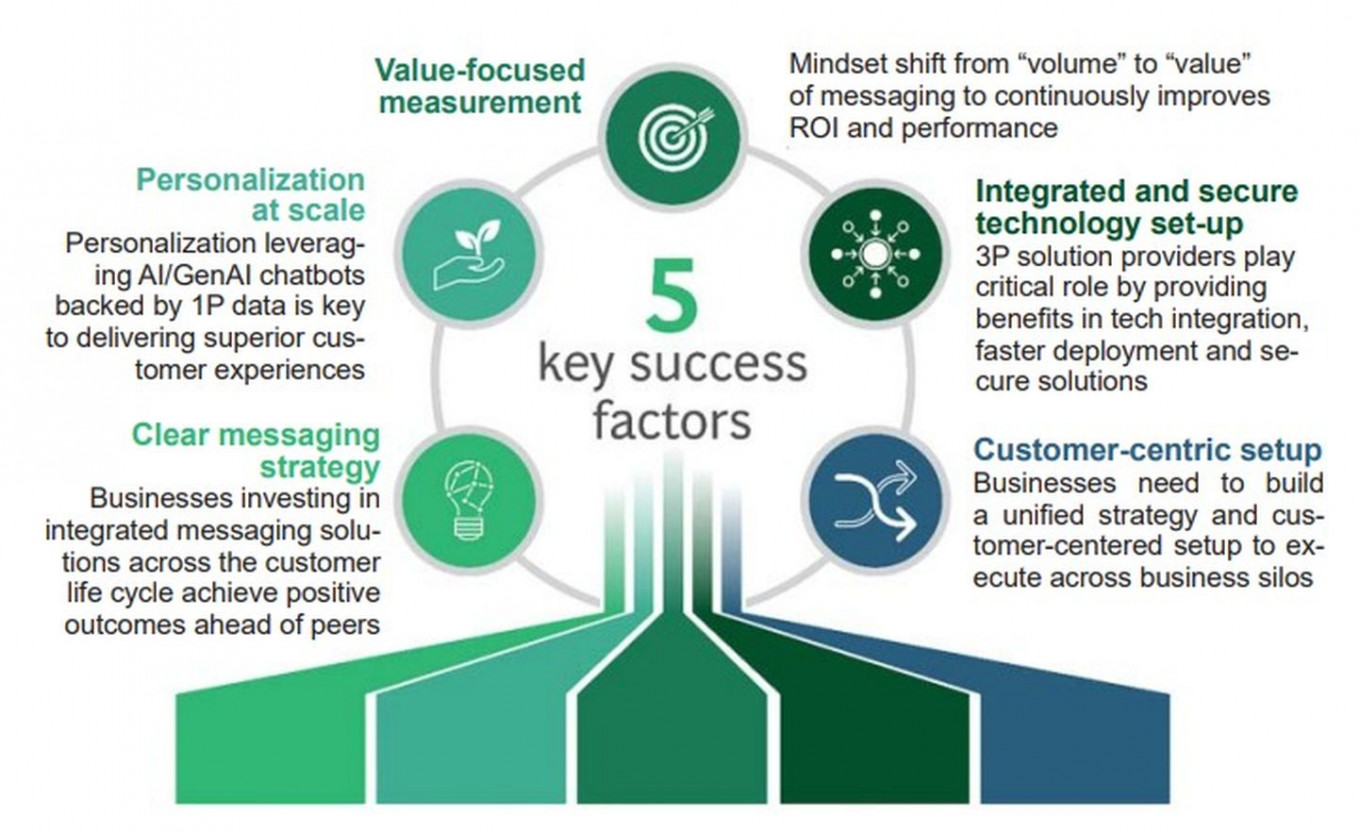Popular Reads
Top Results
Can't find what you're looking for?
View all search resultsPopular Reads
Top Results
Can't find what you're looking for?
View all search resultsWe need to chat about business messaging: Five success factors from RI’s industry leaders
According to a Meta-commissioned Kantar online survey, 87 percent of Indonesians agree that messaging is their preferred way of communicating with a business and 88 percent message with a business at least one a week.
Change text size
Gift Premium Articles
to Anyone
“Can you deliver?”
A simple question like this is now part of everyday communications for most consumers in Indonesia — the question is, can you deliver the right response as a business?
A recent survey of 400 Indonesian businesses undertaken by Boston Consulting Group (BCG) and Meta provides a clear takeaway — organizations need strong business messaging tools and strategies in place to meet the demands of the modern consumer.
Indonesian consumers are messaging businesses all the time, and the timing and quality of your response has never been more important. According to a Meta-commissioned Kantar online survey, 87 percent of Indonesians agree that messaging is their preferred way of communicating with a business and 88 percent message with a business at least one a week. This is no longer just a simple preference, it’s an important priority for businesses to understand.
Happy customers are a key part of any business. The fact that the Kantar online survey shows 68 percent of online adults in Indonesia say they feel frustrated when a business doesn’t offer messaging as a contact option shows the importance of a responsive communication strategy. Without this strategy in place, you’re not only at risk of missing out on opportunities to connect with customers, but actively losing goodwill.
Effective business messaging enables your business to deepen relationships with customers as well as reach more relevant customers when and how they want to interact.
Integrate business messaging across the customer lifecycle
Our recent report, 5 Business Messaging Success Factors from Indonesia's Industry Leaders, shows how common messaging is in today’s consumer conversations. Businesses need to consider this new world of instant communication across all interactions with customers, beyond single, isolated use cases.
The value of an end-to-end strategy is clear. Businesses that employ messaging solutions across all stages of the customer lifecycle reported a remarkable sevenfold higher success rate, compared to those who only use solutions at a single stage.
Indonesia’s largest branded coffee chain, Kopi Kenangan, leveraged messaging to deliver an omnichannel customer journey. It introduced an online-offline mechanism utilizing WhatsApp to distribute promotional codes that drove in-store sales and upsell/cross-sell opportunities, ultimately yielding a threefold increase in conversion of coffee orders and twofold increase in customer retention.
Customer-first mindset and setup are critical
Instant messaging does not mean instant success. Only by putting the customer first can you build a communication strategy that meets each consumer’s personal needs.
Being customer-centric means integrating messaging into your core strategy, monitoring the health of these interactions, centralizing relevant-decision making and creating the right systems to quickly ramp up customer communications as and when your business needs it.
New technology, new conversations
Advances in artificial intelligence (AI) and generative AI (GenAI) are changing how businesses engage their customers. Our findings show that eight out of 10 businesses are planning to invest, or are already investing, in AI for business messaging.
AI shouldn’t be viewed as just an automation tool — it’s about creating a better experience overall. AI chatbots are one of the top use cases, with 82 percent of businesses already using these tools to enable a smoother customer journey.
Business AIs on Messenger and WhatsApp, for example, are designed to enable businesses to better serve customers. These business AIs provide more responsive interaction with customers, from answering common questions to discussing products and finalizing a purchase.
This type of AI-driven solution will provide increasingly effective business messaging tools for the future, particularly when backed by first-party data that can enable personalization at scale.
Focus on value, not volume
Monitoring the right metrics is crucial for understanding business communications. If you want to truly unlock the value of business messaging for your organization, it’s time to start thinking about value as a measure of success, not volume.
Delivering on this requires a value-driven model that includes key performance indicators (KPIs) that matter, for example using return on ad spend (ROAS) instead of cost-per-message. This means measuring relevant signals by assessing business events, such as purchase events, with a clear purpose of optimizing use cases.
Finally, by streamlining measurement of return on investment (ROI) across the different communication channels, you can continuously improve how, where and when you communicate by understanding how customers have previously interacted with your business across all channels.
Technology partners can help
Successfully executing business messaging strategies is an important step, but it’s not one you have to do alone. There are third-party solution providers that can help you take messaging to the next level. 80 percent of businesses who use these solution providers report successful partnerships with them.
These partnerships shouldn’t be seen as simple outsourcing solutions — they help you innovate faster with enhanced messaging capabilities and integration into existing systems, while also ensuring security and compliance. Engaging with partners is a pathway to greater efficiency and fresh possibilities that can help your business keep up with changing customer expectations in a messaging-forward world.
5 business messaging success factors
Our study identifies the strategies which have helped some industry leaders succeed in their adoption of effective business messaging.
- Design a clear messaging strategy which integrates messaging solutions across the customer lifecycle.
- Make sure everything you do is focused on the customer. Incorporate messaging into your core strategy to build the foundation of a unified, end-to-end and customer-centric approach.
- Use messaging to deliver personalization at scale. AI backed by first-party data can provide powerful tools to personalise and enhance customer journeys.
- Focus on value, not volume, to measure what really matters. This will help you demonstrate improved ROI and continuously improve messaging performance.
- Create an integrated and secure technology setup, with the help of third-party solution providers.
Message received?
It’s time to chat about messaging within your organization. Businesses must adopt a strategic approach that focuses on value to succeed in this evolving world of customer communications. AI can support this goal, but focusing on customer needs will always be the heart of an effective messaging strategy. Leveraging the expertise of third-party solution providers can also provide a platform to more rapidly and robustly deliver success.
Now is the time to act. Customer expectations are clear — as soon as that simple message is sent, the clock is ticking on consumer anticipation around how and when your business will respond. The question is, can you deliver?
***
Pieter Lydian is country director for Meta Indonesia. Huy Nguyen-Tuong is managing director and partner at Boston Consulting Group.










